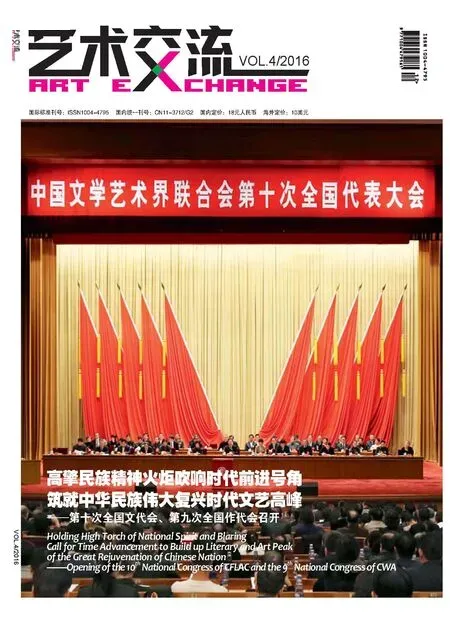交流孕育中华舞台艺术美好未来
——第八届海峡两岸暨港澳地区艺术论坛纵览
文本刊记者 郑荣健 Zheng Rongjian 图本刊记者 杨兴 Yang Xing 译曹宇光 Cao Yuguang
交流孕育中华舞台艺术美好未来
——第八届海峡两岸暨港澳地区艺术论坛纵览
文本刊记者 郑荣健 Zheng Rongjian 图本刊记者 杨兴 Yang Xing 译曹宇光 Cao Yuguang
Bring about a Better Future of Chinese Stage Arts in Exchange——Overview of the 8th Chinese Art Forum of Mainland, Hong Kong, Macao and Taiwan

第八届海峡两岸暨港澳地区艺术论坛与会嘉宾合影Group Photo of Participants of the 8thChinese Art Forum of Mainland, Hong Kong, Macao and Taiwan

郭运德致辞 Guo Yunde Delivered a Speech
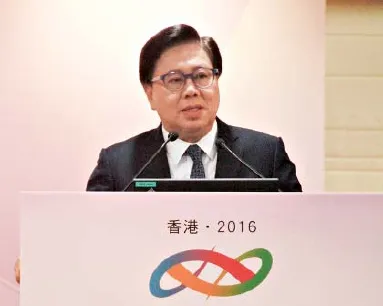
王英伟致辞 Wang Yingwei Delivered a Speech
舞台艺术如何科学地把握和处理好继承与创新的关系?如何汲取、吸纳、融合其他门类的艺术优长来充实提高自身的表现手法?如何充分运用最新科技成果?如何讲好中国故事、传播好中国声音、阐释中国特色?11月1日至3日,第八届海峡两岸暨港澳地区艺术论坛在香港举办,来自海峡两岸暨港澳地区的100多位文艺界知名人士、专家学者参加相关活动。
中国文联副主席郭运德、香港艺术发展局主席王英伟,以及中国剧协驻会副主席季国平,中国文联港澳台办公室主任董占顺等中国文联、文化部、中央驻香港联络办、中央驻澳门联络办有关部室和香港民政事务局负责人出席论坛开幕式。
郭运德在开幕式上致辞。他说,面对当今世界大发展大变革大调整的复杂格局,面对各种思想文化的深度交流和激烈碰撞,面对网络时代带给文艺创作生产与传播的巨大挑战与影响,履行文化的使命担当:需要我们站在时代进步的前沿,积极开掘传统文化的深层蕴含,汲取强大的精神动力,增进文化的民族认同,努力打造当代中国的文化奇观;需要我们以锐意创新的精神,推动传统文化与时代精神、与现代科技和传播手段相结合,鼎力创造与当今时代相匹配的标志性文艺作品和文化品牌;需要我们有博采众长的恢宏气度,大胆汲取人类一切优秀文化的精华,不忘本来、吸收外来、面向未来,永葆旺盛的生命活力,推动中华民族文化的伟大复兴。
此次论坛由中国文联、香港艺术发展局共同主办,以“舞台艺术与中华文化形象”为主题,涉及戏剧、音乐、舞蹈、曲艺、杂技等多个舞台艺术门类。论坛通过大会演讲、分论坛讨论、圆桌对话等形式展开,围绕艺术表演与情感融通、当代艺术的跨界与创新、传统艺术与当代继承、传统舞台艺术中的文化价值、中华舞台艺术的多元表达、传统舞台艺术的传承路径等多个议题,进行了深入而热烈的交流。
11月1日上午举办的主题演讲中,在香港岭南大学教授余少华的主持下,邓宛霞、吴文科、俞亦纲、郭美女、何军妮、邓树荣等专家学者分别就中国艺术之根本、中华曲艺的文化形象、用杂技的“世界语言”展示中华传统文化新面貌、台湾少数民族传统祭仪与音乐之传达意涵、舞蹈教育传统传承与发展创新等话题,分享了自己的研究心得与成果。
当天下午,沈铁梅、谭荣邦、李宇梁、张红、郑培凯、蔡欣欣、叶怡均、张宗真等各领域专家学者、艺术家还就相关议题进行了分组讨论。大家纷纷表示,当今时代,舞台艺术面临着继承与创新等众多课题,应该在深刻理解、研究和传承中华优秀文化传统和美学传统的基础上,与当代发展实际密切结合、有效融合,以崭新风貌的中国表达,讲好中国故事。
11月2日,论坛以“21世纪的中华舞台艺术”为主题举办了圆桌对话。对话由香港艺术发展局委员、香港浸会大学电影学院副教授卢伟力主持,王亚彬、李俊杰、林秀贞、刘惠鸣等专家学者和艺术家进行了深入的交流,分别从自己的艺术和研究实践出发,归纳和畅谈自己感受最深的21世纪中华舞台艺术关键词,现场气氛热烈。
随后,与会专家学者和艺术家开展参访活动,先后到香港西九文化区、香港舞蹈团、香港话剧团、香港中乐团和香港演艺学院等文化机构参观交流,了解香港的艺术发展现状。
“在分享中开阔视野、启迪智慧,在交流中坚定文化自信、强化文化担当,在互动中增进了解、加深情谊。”季国平在论坛总结发言时表示,新观点、新思路的碰撞产生了美丽的火花,诞生了美妙的创意,孕育着中华舞台艺术美好的未来。
自2009年创设至今,海峡两岸暨港澳地区艺术论坛已成功举办七届,相继在海口、台北、澳门、香港、承德、台中等地“开坛”,为海峡两岸暨港澳地区的艺术创作、理论研究与评论搭建了良好的学术交流平台,在加强和扩展彼此间的沟通协作,积极探索中华文艺的发展规律,增强民族文化自豪感和自信心,推动中华艺术走向世界等方面产生了广泛影响。

小组讨论现场 Group Discussion
How can we handle the relationship between inheritance and innovation in a scientific way in stage arts? How can those advantages of other arts be absorbed and integrated so as to enhance ways of expression in a certain art? How can the latest scientific achievement be fully utilized? How can we tell a good story of China, utter the voice of China and elaborate Chinese characteristics? From November 1 till 3, the 8thChinese Art Forum of Mainland, Hong Kong, Macao and Taiwan took place in Hong Kong and over 100 celebrities and experts from the above four regions attended the related events.
Distinguished attendees at the opening ceremony of the Forum were Guo Yunde, vice president of CFLAC, Wang Yingwei, president of HK Arts Development Council, Ji Guoping, executive vice president of China Theatre Association, Dong Zhanshun, director general of Hong Kong, Macao and Taiwan Affairs Office of CFLAC, and the responsible leaders from related parts from Ministry of Culture, Liaison Offices of Central Government in HK/Macao and Home Affairs Bureau of HK.
Guo Yunde delivered a speech at the opening ceremony. As he expressed, the current world is facing a complicated situation with significant development, evolution and adjustment where various thoughts of culture have conducted an in-depth exchange and a fierce collision. The age of Internet has posed a great challenge and influence onto the creation, production and distribution of literature and arts works. In order to fulfill our cultural responsibility, we, in the forefront of the progress, are required to excavate the profound connotation of Chinese traditional culture so as to achieve powerful spiritual motivation, better the national recognition in culture and endeavor for realizing the contemporary China’s cultural wonders. We are required of firm determination and innovative manner to promote the combination of traditional culture with the spirit of the times as well as contemporary scientific technology and media so as to build up literary and artistic works and brands as the landmark of the current period. We are required to absorb all the excellent parts of varied civilization in a bold manner while preserving the essence of tradition so as to retain the everlasting vitality of national culture and realize the great cultural rejuvenation of Chinese nation.
Jointly sponsored by CFLAC and HK Arts Development Council, and under the theme of “Stage Arts and Chinese Cultural Image”, this Forum involved various stage arts such as theatre, music, dance, Chinese Quyi and acrobatics. On several occasions such as keynote speech, group discussion and roundtable talk, this Forum witnessed many profound and enthusiastic exchanges of views on such topics as Artistic Performance and Emotional Communication, Crossover and Innovation of Contemporary Arts, Traditional Arts and Contemporary Inheritance, Cultural Value in Traditional Stage Arts, Multi-Element Expressions of Chinese Stage Arts and Inheritance Approaches of Traditional Stage Arts.
The keynote speech part on the morning of November 1 was presided over by Professor Yu Shaohua from Lingnan University in HK. Such experts and scholars as Deng Wanxia, Wu Wenke, Yu Yigang, Guo Meinv, He Junni and Deng Shurong shared their research achievements and understanding concerning the root of Chinese arts, cultural image of Chinese Quyi, new outlook of traditional Chinese culture in the universal language of acrobatics, essence of musical expression in minority ethnic groups’ traditional rituals in Taiwan and traditional inheritance, and innovative development in dance education.
On the afternoon of November 1, group discussion concerning related issues took place among artists and experts such as Shen Tiemei, Tan Rongbang, Li Yuliang, Zhang Hong, Zheng Peikai, Cai Xinxin, Ye Yijun and Zhang Zongzhen. Their remarks reached a consensus that stage arts of the current period are confronted with muttiple topics such as inheritance and innovation. On the basis of deep understanding, research and inheritance of excellent Chinese cultural and aesthetic traditions, such topics need to achieve a close combination and effective integration with the practical development so as to tell a good China’s story by means of a novel Chinese expression.
On November 2, roundtable talk under the theme of “Chinese Stage Arts in the 21stCentury” was presided over by Lu Weili, member of HK Arts Development Council and associate professor at Film Academy of Hong Kong Baptist University. Artists and experts such as Wang Yabin, Li Junjie, Lin Xiuzhen and Liu Huiming, in a passionate atmosphere, conducted an indepth exchange and elaborated from their own perspective of art or research practice on some key words of Chinese stage arts in the 21stcentury.
In the following days, the experts and artists visited Cultural District of West Kowloon, Hong Kong Dance Company, Hong Kong Repertory Theatre, Hong Kong Chinese Orchestra and Hong Kong Academy for Performing Arts so as to learn about the current situation of art development in HK.
“By sharing, we have broadened our vision and get inspired in wisdom. In the exchange, we have reached a firm selfconfidence and a strong sense of responsibility in culture. In the interaction, we have gained a better understanding and enhanced friendship.” Ji Guoping concluded in summary of this Forum. Great ideas and wonderful imagination sparkling during the collision of various new viewpoints and ways of thinking, which will probably bring about a better future of Chinese stage arts.
Ever since 2009, this Forum has witnessed a consecutive success in the previous seven sessions in Haikou, Taipei, Macao, HK, Chengde and Taichung. As a sound academic exchange platform set up for artistic creation, theoretic research and critics, this Forum has produced an extensive impact on strengthening and expanding mutual communication and coordination, exploring development principles of Chinese literature and arts, enhancing cultural pride and selfconfidence of Chinese nation, and promoting Chinese arts in the global arena.

邓宛霞(香港艺术发展局委员、戏曲表演艺术家)
中国的艺术、文学不是描述事物,而是在呈现自己的内心。宗白华曾经说过一句话,中国画的特点就是气韵生动。站在最高位,一切服从“动”,可以说没有“动”就没有中华戏曲。比如说京昆,它的所有程式、动作就是按照这种思维诞生的,如果保留京昆的身段,而给它加上很多另外的东西,你就会觉得别扭,因为原本是为了表现一种动态、神韵和当下捕捉的东西,是邀请你去遨游,而不是堆砌。中国戏曲的程式,行当、打击乐、服装、化妆都是一种程式,都是一种形。戏曲有各种不同的行当,不同人物、不同年龄、不同性格、不同社会地位的人物分成生旦净丑,而下面还有很多分支,人们把这些各种不同形象归纳为一套一套的技巧,掌握某一行当的技巧,就可以试演这一类的人物,从而解决了形的问题。至于神,那要靠演员自己本身的修炼。任何东西都是有讲究的,你们用它的元素时,不考虑它的整体,那结果是我们现在看到的状况,不能让人特别满意。我觉得,现在这个时代应该重温一下我们的根本,然后可以有更多融合,更好地往前走。
Deng Wanxia, Member of Hong Kong Arts Development Council and Performing Artist of Chinese Local Opera
Instead of depicting objects, Chinese arts and literature aims at presenting its inner world. Zong Baihua once said, the dynamic living rhythm is the most important and distinct in traditional Chinese painting. “Moving” is the paramount and without it, traditional Chinese opera never makes sense. Just take Peking opera and Kunqu opera as examples, all the stylization and gestures are designed in the light of such logic. If you only preserve the postures of Peking opera or Kunqu opera and add something else, you will find this change very disagreeable, because the posture is intended to present a dynamic charm and captured mood in a constant motion instead of a series of gathering. Role of type, percussion, costume and cosmetics in traditional Chinese operas are all but various stylizations. As there are various types of roles for different characters, ages, sentiments and social status, one who is capable of the skills of a certain type can play any role of this type, which is the material side. As to the spiritual side, it will depend on the actor’s selfattainment in acting. There is always a principle to follow in any profession. If a single element is adopted without any consideration of the entire circumstance, the current situation will prove to be a mediocre result. In this age, it is high time we should return to our original basis, and with more possible integration, we will achieve a better advancement.

吴文科(中国曲协副主席、中国艺术研究院曲艺研究所所长)
从中国曲艺的自身发展来看,当今内地曲艺的曲本创作与表演实践,存在着太多的问题与遗憾,其解决途径,有赖对自身艺术独有特征和多样功能的正确理解与准确把握。只有真正明白了曲艺是什么,曲艺的艺术优长和表演擅长在哪里,才不致将传统继承搞成抱残守缺,将发展创新弄成南辕北辙;才会远离戏剧化、歌舞化、杂耍化的迷误,避免“改行”式的“改革”“创伤”式的“创新”和“革命”式的“革新”;进而改变创作表演“重形式、轻内容,重短段、轻长篇,重表演、轻创作,重技术、轻艺术,重演员、轻伴奏,重数量、轻质量,重包装、轻内涵,重宣传、轻实干”的跑偏路径;最终通过对于自身传统的深入学习和深刻继承,既返璞归真也返本开新,既礼敬传统也发展繁荣。
从中华文化的当代复兴去看,要想真正确立起自身的文化自信,首先要对自己的文化传统及其价值了然于胸。既不妄自尊大,也不妄自菲薄。这就有赖对包括曲艺在内一切中华优秀传统文化的正确认知和深刻传扬。只有通过对自身历史文化全面系统的学习了解和继承弘扬,将自信建立在自觉、自尊和自豪的基础上,才不会自卑、自虐和自残,才能够自重、自立和自强。
Wu Wenke, Vice President of China Quyi Artists Association, President of Quyi Institute of Chinese National Academy of Arts
As far as the development of Chinese Quyi is concerned, there are too many problems and regrets in the current plot creation and performing practice of Quyi. The resolution is greatly dependent on the correct understanding and accurate grasp of its unique characteristic and multiple-functions. Only with genuine knowledge of what Chinese Quyi is and what the artistic advantage and performing advantage of Chinese Quyi are, can one avoid taking conservative copying as inheritance of tradition, misunderstanding development or innovation, and fallacy in transforming Quyi into theatre, song and dance, or juggling. Reform should never means business change.Innovation should never bring wounds Renovation should notbe equivalent to revolution. The usual deviation in art creation and performance such as “prefer formality to contents, prefer short passage to lengthy volume, prefer acting to creation, prefer skill to artistry, prefer actor to instrumentalist, prefer quantity to quality, prefer publicity to connotation, prefer reputation to capability” should be changed. Ultimately, by in-depth learning and profound inheritance of tradition, one can return to nature with innovation as well as achieve prosperous development while honoring the tradition.
As far as the current rejuvenation of Chinese culture is concerned, before establishing a real self-confidence in culture, we must have a clear knowledge of our tradition and its value. In order not to be conceited or overly modest, we must achieve a proper recognition and a deep understanding of all the excellent Chinese cultures, including Chinese Quyi. So long as we can understand our own history and culture in an all-round way and promote the inheritance, our self-confidence will be based upon self-esteem, self-consciousness and pride, and we will keep our self-respect and independence inplace of self-abasement, self-torment or selfdestruction.

俞亦纲(中国杂协副主席、上海杂技团团长)
随着时代发展,娱乐方式越来越多元化,人们的欣赏习惯发生很大变化,这对传统杂技形成了很大的冲击,特别是在海外演艺市场,中国大型杂技表演逐渐失去优势。面对与世界一流团体在艺术表现上的差距,上海杂技团痛定思痛,尝试在创作中融入中华传统文化,运用杂技的国际肢体语言艺术来讲“中国故事”,由此开始了中国杂技艺术向更高层次发展的探索之旅。
总结起来,大致有三个方面的经验:一是以舞台新科技探索杂技艺术新模式,在表演中融入更多的舞台新科技,打造有意境的海派杂技,比如杂技剧《时光之旅》等;二是以艺术形象传播中华文化,如中华风俗杂技剧《十二生肖》,选题吸引了演出商,演出后也掀起了生肖文化热,在海外取得热烈的反响。三是文化的力量振奋人。上海杂技团原创杂技综合剧《小龙飞天》首轮国际巡演时,恰逢法国发生恐袭事件,剧组克服困难实现首演,并参与到当地的电视慈善直播,筹措善款,传递正能量,树立了中国杂技良好的文化形象。
Yu Xigang, Vice President of China Acrobats Association, Head of Shanghai Acrobatic Troupe
Along with the progress of times, entertainment has more and more ways of expression and great changes have taken place in the people’s habit of appreciation, all of which have deal a heavy blow to the traditional acrobatic shows. Particularly in overseas market of performing arts, Chinese large-scale acrobatic show hasgradually lost its advantages. In the light of its backward position concerning artistic expression from the first-class troupes in the world, Shanghai Acrobatic Troupe was determined to integrate traditional Chinese culture into acrobatic creation and by this trial, tell “Chinese stories” in the universal body language of acrobatics. This started Chinese acrobatic art’s exploration for a higher level of development.
In conclusion, we have experience in the following three aspects. First of all, we explore the new formality of acrobatic art via new stage technology. With more new stage technology involved, Shanghai style of acrobatic program of cultural connotation such as Acrobatic Theatre Journey of Time was established. Secondly, we spread Chinese culture through art image. For example, the Chinese folkloric acrobatic play Twelve Chinese Zodiac attracted many overseas performance companies, aroused a fashion of Chinese zodiac culture and gained a passionate feedback. Thirdly, we resort to the encouraging power of Chinese culture. The first round of international tour of the original acrobatic comprehensive play Little Dragon Flying in the Sky coincided with the terrorist attack in France. The cast overcame various difficulties to realize the premiere on time and participated in the live donation of charity on TV. By expressing good will and positive energy, a perfect cultural image of Chinese acrobatics is established.
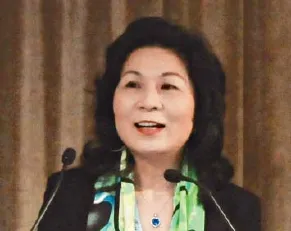
郭美女(台东大学音乐系主任、教授)
在台湾少数民族族群的音乐中,歌唱在布农部落的生活中是极为普遍的,他们不仅在日常中以歌谣相呼应来替代语言,更在传统祭典中以歌声传达出对上天的崇敬之意。布农部落音乐的形成,除了具有族群、地理环境与音乐本身的特质外,其传统的社会组织和农耕生产、狩猎渔获、神话传说、宗教信仰、生命礼仪、传统祭典仪式等等,都是布农音乐最重要的文化背景。
音乐在布农部落社会的传达过程中,是族人讯息、行为的传达表现方式,尤其生活中牵涉到的宗教祭仪、禁忌、规范、仪式行为,不但具有其特殊的渊源和“意指”作用,音乐讯息产生的各项功能,更具有其宗教与社会的象征性和独特性。台湾布农部落以人声为乐器的歌唱方式不仅纯朴、自然,更具有饱满的和声效果,其演唱方式通常可分为以下几种:独唱、重唱、合唱、朗诵式的领唱与合唱。在布农部落的社会里,生命礼俗、农耕狩猎惯习、禳袚避祸等传统祭仪文化,都以歌谣音乐作为媒介,并环绕着这三者形成交集。可见布农音乐并非单纯的声响再现,对于布农音乐除了声音的记录和分析外,其音乐语言的特殊性和传达功能,必须透过符号的译码和分析,将内在生命具体化、客观化。因此,利用“符号学”传达的观点来探讨台湾布农音乐如何反映文化内涵与社会的互动关系,如何感知、体验音乐语言所要传达的文化意涵和功能等,是研究台湾少数民族音乐不可忽视的重要问题。
Guo Meinv, Director General and Professor of Music Department of National Taitung University
Among the music of minority nationalities in Taiwan, singing is most common in the life of Bu Nun tribe. They not only sing ballads in daily life in lieu of language, but also present songs to show their respect for God in their traditional ritual. Besides such factors to form the music in Bu Nun tribe the features of ethnic group, geography and music, their traditional social organization, agricultural production, fishing and hunting, myth and legend, religious faith, living ritual and traditional sacrifice are all important cultural backgrounds for their music.
In the course of communications in the Bu Nun tribal society, music is the way of conveyance and expression of tribal information and action. In particular, the religious ritual, taboo, standard and ceremony in their life have their special indication and sources, and various functions arising from the musical information is blessed with symbolic and unique feature in religion and society. The Bu Nun tribe in Taiwan adopts human voice as musical instrument, which, simple and natural, achieves an amplified effect of chorus. Its way of singing can fall into several categories: solo, duet, chorus, and recitation-type leading and chorus. In their society, ballad music is the only media in their traditional ritual culture of birth celebration, farming and hunting custom, and evasion from disaster.The music of such three ritual occassions have intersections with one aother. As the Bu Nunmusic is not simply the reproduction of sound, the recording and analysis of sound is far from enough. The special feature and function of communication in their music language must be decoded and analyzed into an objective presentation with details. how to utilize views from semiology to discuss Bu Nun music’s reflection of the interactive relationship of cultural connotation and society, and how to sense and experience the intended cultural connotation and function of a music language are necessary key issues to address in the music research of minority nationalities in Taiwan.
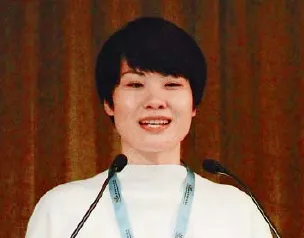
何军妮(澳门演艺学院舞蹈学校副校长)
在舞蹈的教材与教学中,如何传承传统文化,如何对待现代艺术的冲击,是一个既无法回避又亟待解决的问题。随着时代的快速推进,传统文化所赖以生存的时间、空间和载体在逐渐瓦解;舞蹈亦如此,传统舞蹈的文化生态正经历着由传统向现代转型的阵痛。一方面,舞蹈从业者急切地希望融入创新转型的浪潮中,获取更大的发展和广阔的资源;另一方面,又在浪潮的抉择与认同中陷入一种“自我认知”的迷茫。如何寻找自身独特性和核心价值,提升舞者文化学养的修行,是舞蹈教育需要重视的。
学校的课程教育需摒弃单向思维、单轨制、单向目标,多元全面的设置更显重要。传统,不能被视作发展创新浪潮中时髦的“怀旧情绪”,它是过去延传到现在的一条连接链和变体链,是过去和现在统一性与连续性的重要支撑。对于传承,首要要强调的是做好扎实的传统教育,强调教育的回归。经典教育是学校教育的重要载体和路径,用经典丰润教育,用经典滋养人生,用经典启迪创造,用经典链接古今。推进创新需要“在坚守中走向超越”。传统更新的过程是一种文化的濡化过程,只有后来者不断为既存的传统增添新的内容和新的典范,传统才更充实、更具价值,才可能不着痕迹地融入现在,成为活着的传统。现今的文化形态日趋多元,对于舞蹈艺术人才的需求亦不止步于技术层面。
He Junni, Vice President of Dance School of Macao Conservatory
In the teaching and textbook choice of dance, how to inherit the traditional culture and how to cope with the impact of contemporary arts are questions that can’t be evaded and awaits to be solved. Along with the rapid advancement of times, the time, space and carriers that traditional culture used to depend on has gradually disintegrated, and so is the dance. The cultural ecology of traditional dances currently undergoes labor pains in the transition from tradition towards modernity. On the one hand, the dance undertakers are eager to be integrated in the fashion of innovation so as to obtain more development and resources. On the other hand, they are trapped into confusion about self-recognition in the dilemma of fashion choice and identity recognition. How to find a dancer’s own unique characteristic and core values, and how to promote his or her cultivation and knowledge is an aspect to attach importance to in dance education.
Any one-way thinking, operation system and objectives must be abandoned in the educational curriculum in schools and universities, while a multi-element and all-round set-up seem to be more important. Tradition, as linkage and transformation from the past to the present as well as of the education crucial backbone for the continuity and unity between them, ought not to be considered as a fashionable “nostalgia” in the tide of development and innovation. For inheritance, a solid education about tradition should be stressed as the original intention. As a key carrier and path of school education, classics will present times education, nutrition people, enlighten creation and connect the ancient past with the current time. Promotion or innovation should adhere to the principle of “transcendence based upon tradition”. The innovation of tradition is actually a course of enculturation. Only by the descendants’ constant adding of new contents and samples to the existent tradition, can the tradition become more substantial and valuable, and be integrate into the present times without trace in the form of a “living tradition”. In face of the current in the multi-element trend incultural information, the requirement for a qualified talent in dance is far beyond mere skills.
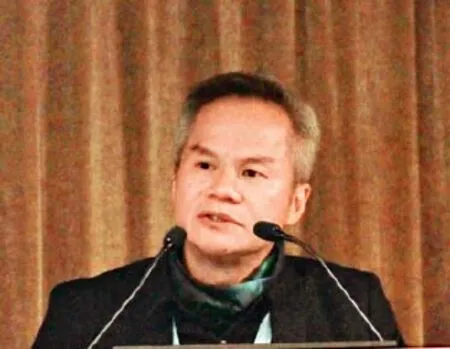
邓树荣(香港邓树荣戏剧工作室艺术总监)
我们这一代的香港人经历了英殖民统治时期及回归后的“一国两制”,找寻文化身份成为相当一部分艺术家的探寻话题。我从事剧场工作,但大学时念的是法律,后来留学法国,发现欧洲戏剧人对东方传统戏剧很有兴趣。从法国人对东方文化的感受及提问中,我发现了东方文化的某些核心东西:强调虚实,重意境而非实体。我发现,要更真切地理解及内化自身成长的一个重要文化构成部分,往往最有效的方法就是短暂离开。有距离,或许会看到一些新东西,有一些新感受,或更能用一些不太惯常的方法表达这些感受。
人的文化构成是有阶段性的,会不断与其他文化接触与交融,形成一种有自我更新机制的文化内涵。我最深刻的领会是一种超越种族的剧场身体文化。剧场是现场表演,无论何种类型的剧场,一定有演员的身体。而身体就是人类的本体存在,这本体存在并非身体的特定动作文化,更非语言,而是不同人种作为一个有机体的所有生理及心理上的共通点。我学习现代舞、杂耍、面具表演,进行体能意志训练、小丑表演等形体表达,结合了太极及戏曲,悟出了一些对我非常重要的发现:戏剧的训练及创作实则是身体整体感觉的训练,而身体的训练首先是“去语言化”,或我称之为“前语言”的表达方式。表演其实就是讲感受及表达,任何的训练体系都是要学员以最真诚、最有效的方法去行动及响应。文化,不光是看得见的实体产物,还有看不见的思维技巧及想象力。
Deng Shurong, Artistic Director of Deng Shurong Theatre Studio in HK
As our generation has experienced both the British administration and “One Country, Two Systems” after 1997, pursuit of cultural identity has become an interesting topic for quite a part of local artists. I am now engaged in theatre, but my major in university was law. When I studied in France, I came to realize that those theatre professionals in Europe were interested in the traditional theatre of the Orient. From those French people’s feelings and questions concerning Oriental culture, I have found something essential in it,i.e, stress on reality and vision, focus on conception instead of objects. As far as I am concerned, the most effective way to comprehend and absorb an important component of culture in one’s own grow-up is to leave for a while. With a certain distance, one will see and feel something new or find some unusual ways to express such feelings.
A person’s cultural formation is of several stages. Along with the contact and interaction with other cultures, can be established a kind of self-update mechanism for cultural connotation. My most profound comprehension comes from a kind of Physical Theatre Culture that goes beyond race. It is a live performance. Regardless of venue types, performers’ body must be available. As a main subject for human existence, body is something physically and mentally in common of varied races as organism not a specific action culture or languages.. I have learned modern dance, juggling and mask performance, undergone training of physical strength and mental will as well as such body expression as clown acting. Combined with Taiji boxing and traditional Chinese operas, I came to realize some discoveries expecially important myself: the training and creation of theatre is actually that of entire feeling of body, a training “without language”, or as I call it, an expression “prior to language”. Acting is nothing but one’s feeling and expression. And any training systems world require the trainees to act and respond with the most sincere and effective ways. Besides visible objects, culture involves invisible skill, in thinking and imagination.
“21世纪的中华舞台艺术”圆桌会议精彩观点Excellent Viewpoints in Roundtable Talk “Chinese Stage Arts in the 21st Century”
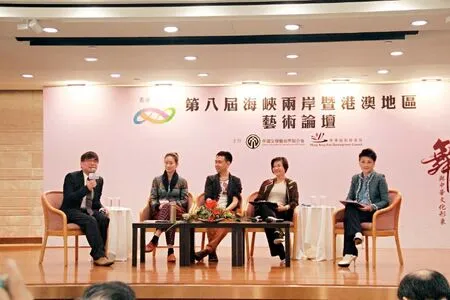
圆桌会议现场 Roundtable Talk
卢伟力(香港艺术发展局委员、香港浸会大学电影学院副教授)
舞台艺术在21世纪牵涉到很多方面,我们谈论的中华表演艺术,作为一个文化的系统,有几个方面我们可以思考:首先,是形而下的层面,一般来说是器物层面,我们可以看到的茶杯是用来装水的,这是器物层面,实实在在的舞台、桌子是器物层面的问题;其次,是形而上的层面,我们怎么样思考问题,什么样才是美,牵涉到这里不同的文化对表演的态度和看法,这是观念形态的层面,观念形态包括我们比较关心的政治思想、意识形态问题。另外,不同的表演艺术的组织方法不同。再有,不同的文化,原来有不同的行为,这些行为有些是跟上面三个有关联,有些是跟本地的地理气候有些关联,南方和北方不同,东方和西方文化传统不同,这四个方面都是影响中华舞台艺术走向未来的关键因素。
Lu Weili: Member of Hong Kong Arts Development Council, Associate Professor of Film Academy of Hong Kong Baptist University
The stage arts in the 21stcentury have involved many aspects. The Chinese performing arts in our discussion function as a cultural system and have the following aspects for our reflection. First of all, it refers to the concrete objects such as the stage and table visible teacup for containing water. Secondly, it refers to the metaphysical level such as the way of thinking, the definition of beauty, and varied attitude and opinions of different cultures towards acting, all of which are called conceptual formation. Politics, philosophy and ideology are included as well. thirdly, different performing arts have different ways of organizing the contents. Lastly, different cultures have different behaviors that have connections with the above three factors as well as geographic characters, for example North vs South and Orient vs Occident. All above four aspects are key factors that will influence the future of Chinese performing arts.
王亚彬(亚彬舞影工作室艺术总监、青年舞蹈家)
21世纪中华舞台艺术的关键词是:开放、融合、创新。开放的心态是既不排斥接受传统文化的训练和学习,未来对新鲜事物也不拒绝它的发展和创新的方向,我在创作过程中一直都在平衡一个关系,即如何平衡好继承和发展的关系。在创作的过程中,一方面,很多时候需要回溯,要往历史的纵深走。比如,中国古典舞组成的元素是从哪里来的?另一方面,就是向未来走,我们要不断地发展、创新。在做继承和发展的同时,在创作的时候就像做舞蹈动作一样,要找到一个着力点,有了这个着力点,在发力的时候就有了依据。
Wang Yabin: Artistic Director of Yabin "Dance in Shadow" Studio·Young Dancer
The key words for the Chinese performing arts in the 21st century are openness, integration and innovation. In an open mind, one will not refrain from accepting training and learning of traditional culture or refuse the direction of development and innovation of something novel in the future. I have been balancing a certain relationship in my creation,i.e,the relationship between inheritance and development. During my creation, I often need to look back deep into history to explore answers to such question as where the comprising elements of Chinese classical dance come from. On the other hand, we need constant development and innovation on our way to the future. To make a perfect balance between inheritance and development in creation, just like choreography, I must find a point of balance at which my strength will find its own basis.
李俊杰(澳门戏剧农庄行政总监)
澳门的舞台艺术还处在逐步走向专业化和演员迈向全职化的阶段,一直以来澳门大部分表演者都是业余从事舞台表演艺术,最近十年得到政府的支持,慢慢有些人在澳门基金会的支持下可以成为全职的演员。澳门人口比较少,是一个休闲城市,如果要以本地市场来维持我们的创作很困难,所以我们必须要教育,教育不单是希望更多人从事表演艺术,更希望多一点观众欣赏表演艺术,开拓观众群很重要,而且开拓也要努力把我们的表演带到澳门以外的地方,把市场扩大。戏剧表演是用生命影响生命的表演艺术,教育就是一种人与人之间的文化传递,对于我来讲,教育和开拓是很重要的关键词。
Li Junjie: Administrative Supervisor of Macao Theatre Farme
The performing arts in Macao are still in the gradual process of getting professional and towards actors’ full-time engagement. Most of performers in Macao are amateurs engaging in performing arts in their spare time. In the recent decade, thanks to great support from SAR government, some groups with finance from Macao Foundation have bwilt up their full-time cast. With a small population, Macao is a city for leisure, and it is extremely difficult to sustain our production merely based upon local market of theatre. Therefore, we must resort to education and exploration. By education, we mean to bring more not only audiences to enjoy performing arts but also more actors into performing arts. By exploration, we expect to explore a bigger market in the future outside Macao with our utmost efforts. Theatre acting is a kind of performing arts that life influences life, and education is a kind of cultural relay from one person to another. To me, education and exploration are key words which special significance.
林秀贞(台湾艺术大学舞蹈学系教授)
台湾的资讯业非常发达,科技和网络的发达大幅度改变了我们的生活以及我们的工作,艺文生态和艺术的表现形式在现在台湾的表演艺术里面也受到非常多的影响,表演艺术在跨界整合和创新上增加了很多可能性。艺术和科技似乎是不同领域,如果双方非常相得益彰地整合,我想是会有相辅相成的效果,同时也可以激荡出新的创新火花。中华文化的表演艺术有它的实力和成就,当今艺术创作者可以借由跨领域的整合发展舞蹈艺术新的可能性。创新是有规律可循的,并不是为新而新。昨天的创新是今天的传统,今天的创新是明天的传统,我们想要创新就要从传统中摄取养分,要有传统一定要把握住基本功,在创作之前要更强化基本功,创作的时候才有能力从传统中萃取精华,加以转化和应用。
Lin Xiuzhen: Professor of Department of Dance, National Taiwan University of Arts
With advanced information industry in Taiwan, the development of scientific technology and Internet have considerably changed our life and work,and influenced the literary and art situation as well as ways of expression in performing arts in Taiwan. More possibilities are emerging in the crossover innovation and integration. Though arts and science seem to stand in isolated fields, with a perfect integration of mutual benefits, both of them will achieve complementary effects and inspire sparklings of innovation. As the performing arts in Chinese culture have their own power and achievement, the current artists can develop the new possibility of dance art via crossover integration. For innovation, there are some principles to follow as well, and it is never for the mere sake of something new. Yesterday’s innovation becomes today’s tradition while today’s innovation will be tomorrow’s tradition. In order to make innovation, we must absorb nutrition from the tradition and we must strengthen our basic skills to master tradition. Only with a solid foundation of basic skills can we draw essence from the tradition for further transformation and practice in our artistic creation.
刘惠鸣(香港艺术发展局委员、香港粤剧演员会理事长)
传统是传统,传统一直在变,现在是未来的传统,如果不变就没有演员的个性,没有流派的出现。在保留传统之外,要加上自己的表演方法,保留前人好的地方,再加上当代思想才可以流传下去。艺术是很主观的,没有一把尺衡量艺术是好还是坏。要勇敢地尝试,不尝试不知道是好是坏;要勇敢地接受批评,如果不接受批评不会做得更好,同时还要过滤掉一些批评。如果一半人喜欢你的东西,另一半人不喜欢你的东西,你要勇敢坚持你自己的概念;同时,还要学会勇敢地接受自己的失败。
Liu Huiming: Member of Hong Kong Arts Development Council, President of Hong Kong Cantonese Opera Performers Society
Tradition keeps changing and the current fashion will become tradition in the future. Without change from one to another, there would be no personal characters or schools. One must present his or her own acting while preserving the tradition. Only by preserving the predecessor’s virtue and supplementing current thinking can any kind of art be passed down from generation to generation. As a subjective existence, there is no set criterion to decide the quality of arts. Actors must be brave to keep on trying because they will never know the result if they dare not try. Actors must be brave to accept criticism because otherwise they will never go further in artistry. Of course, they must know to filter off some incorrect criticism. If half of the audiences favor your acting and the other half dislike yours, you must be brave to be yourself. In the meanwhile, you should have the courage to accept your failure if any.

